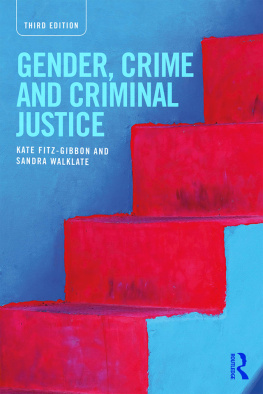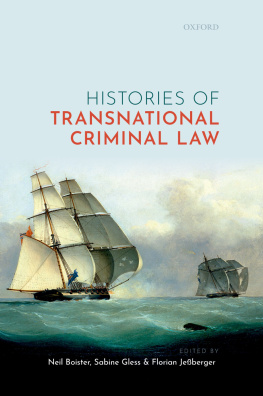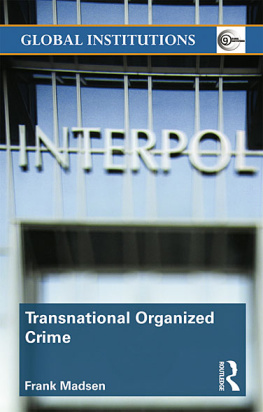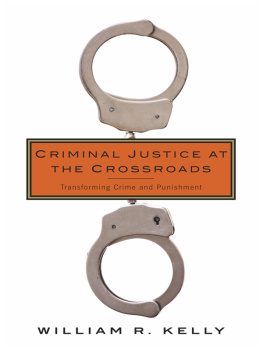SAGE Publications Ltd
1 Olivers Yard
55 City Road
London EC1Y 1SP
SAGE Publications, Inc.
2455 Teller Road
Thousand Oaks, California 91320
SAGE Publications India Pvt. Ltd
B 1/I 1 Mohan Cooperative Industrial Area
Mathura Road, New Delhi 110 044
SAGE Publications Asia-Pacific Pte. Ltd
3 Church Street
#10-04 Samsung Hub
Singapore 049483
Marinella Marmo and Nerida Chazal 2016
First published 2016
Apart from any fair dealing for the purposes of research or private study, or criticism or review, as permitted under the Copyright, Designs and Patents Act, 1988, this publication may be reproduced, stored or transmitted in any form, or by any means, only with the prior permission in writing of the publishers, or in the case of reprographic reproduction, in accordance with the terms of licences issued by the Copyright Licensing Agency. Enquiries concerning reproduction outside those terms should be sent to the publishers.
Chapters 6 and 7 Andrew Goldsmith 2016
Library of Congress Control Number: 2015948822
British Library Cataloguing in Publication data
A catalogue record for this book is available from the British Library
ISBN 978-1-41291-924-1
ISBN 978-1-41291-925-8 (pbk)
Editor: Amy Jarrold
Editorial assistant: George Knowles
Production editor: Sarah Cooke
Copyeditor: Jane Fricker
Proofreader: Audrey Scriven
Indexer: Judith Lavender
Marketing manager: Sally Ransom
Cover design: Wendy Scott
Typeset by: C&M Digitals (P) Ltd, Chennai, India
Printed and bound by CPI Group (UK) Ltd, Croydon, CR0 4YY
About the Author
Dr Marinella Marmois Associate Professor in Criminal Justice at Flinders University Law School. Marinella researches in the areas of international criminal justice and transnational crime. Currently, she works in the area of migration, border control and human mobility. She has co-authored the books
Crime, Justice and Human Rights (with Leanne Weber, Elaine Fishwick) and
Race, Gender and the Body in British Migration Control (with Evan Smith) and co-edited a number of books. Her research has been widely cited in numerous newspapers, including the
Guardian and the
New York Times. She is the recipient of an Office for Learning and Teaching Citation for Outstanding Contributions to Student Learning by the Australian Federal Government.Dr Nerida Chazalis a Lecturer in Criminology at Flinders University, Australia. Her research examines the aims and functioning of international criminal justice in a complex and increasingly global world. In particular, she researches the International Criminal Court and state crime. She is the author of
The International Criminal Court and Global Social Control (Routledge, 2016) and the co-editor (with W. De Lint and M. Marmo) of
Criminal Justice in International Society (Routledge, 2014).
Also with contributions from:Andrew Goldsmithis Strategic Professor of Criminology at Flinders University, Adelaide, Australia. He is also director of the universitys Centre for Crime Policy and Research. He is trained in law, criminology, and sociology, and has researched and taught at universities in Canada and the United Kingdom as well as in Australia. He is the founder of the Illicit Networks Workshop, an international collaboration of scholars interested in transnational and organized crime, corruption and terrorism. His research interests include the governance of policing, transnational crime, the impact of new technologies upon crime and policing, and corruption in prisons.
Preface
This book aims to respond to the desire of students of any level and practitioners to know more about the subject of Transnational Crimes and Criminal Justice, and to address the many questions we academics may well often take for granted. Assumed knowledge can be discouraging to those willing to learn more about a topic.
The main concern has been that students and other people new to these topics may feel disenfranchised even in matters where they have shown strong interest. There is a tendency amongst academics to write and deliver complex papers in class; however, after years of teaching this subject at undergraduate and postgraduate level, we have learnt a valuable lesson: the questions received can be basic, for example What are transnational crimes? What is the international community?. Further, we are mindful of Pratt calling for academics to relearn how to talk like a real person again (Pratt 2008: 46) referring to the complicated academic jargon criminologists use when talking about their research to the lay person. We are also aware that the new generation of learners or academics and practitioners approaching this subject for the first time may have a different way of mapping out and building on knowledge.
With this book, we aspire to offer a stepping stone to produce the enthusiasm and inspiration to continue with this topic. Therefore, we see this book as a friendly platform for those students, academics and practitioners who approach enthusiastically these topics for the first time, coming from a range of diverse backgrounds, and would like to expand their knowledge without being intimidated by its complexity and inevitable jargonistic discussion around globalization, transnational matters and human rights.
The chapters are based on several years of lecture notes and discussion with upper level students, postgraduates and academic experts in the field. The material the book offers aims to come across as a conversation both in the structure and content. Examples are given as often as possible to offer a way to engage with abstract material in more concrete terms. In essence, this seeks to be pedagogical material, with the ambition to gain and maintain the interest of the reader.
At times, choices have been made leading to a simplification of complex material. If students feel that they want to know more after reading about one of the many subjects covered, the book has already achieved its purposes.
Our sincere gratitude goes to the Sage commissioning editors and assistant editors for believing in this project from the start to the end; yes, there has been an end product at last! In particular, our gratitude goes to Caroline Porter, Natalie Aguilera, and Amy Jarrold.
We are also indebted to a number of colleagues for their feedback and encouragement: Ryan Conlon, Derek Dalton, Mark Israel, David O. Friedrichs, Mary Heath, Evan Smith, Anne Mignone and the Faculty of Education, Humanities and Law of Flinders University for their financial support during this project.










